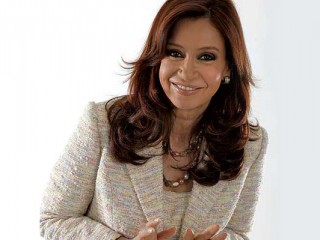
Cristina Fernández De Kirchner biography
Date of birth : 1953-02-19
Date of death : -
Birthplace : La Plata, Buenos Aires, Argentina
Nationality : Argentine
Category : Politics
Last modified : 2010-07-23
Credited as : Politician, President of Argentina, World's political leader
0 votes so far
Cristina Fernández de Kirchner became the first woman to be elected president of Argentina, on October 29, 2007. As Time magazine noted, Fernández is "a veteran lawyer, legislator, and stateswoman, as well as a political fashion plate" who is often called "The New Evita." However, unlike the charismatic Evita Perón (who never held office), or dictator Juan Perón's third wife, Isabel (who succeeded to the presidency after her husband's death), Fernández is the first woman ever to face the electorate and rise to Argentina's highest office through the ballot. She is the second South American woman to ascend to her nation's presidency after Michelle Bachelet of Chile.
Fernández was born in La Plata, capital of the Province of Buenos Aires. She was schooled there and studied law at the Universidad Nacional de La Plata (National University of La Plata), where she met her future husband, a fellow law student named Néstor Kirchner. The couple were married on March 9, 1975; and over time they had two children, Máximo and Florencia. Fernández obtained her law degree in 1979; and she and her husband practiced law in Rio Gallegos throughout the 1980s. Longtime followers of the Perónist Justicialist ("Front for Victory") Party, Fernandez entered politics in 1989 and was elected as a representative to the Santa Cruz provincial legislature. She was reelected in 1993.
Throughout the 1990s Fernández continued her political climb, being twice elected a senator representing Santa Cruz and once as a member of the Chamber of Deputies. Meanwhile, her husband's own political star was rising, and with Fernández campaigning vigorously on his behalf he was elected President of Argentina in 2003. This victory was somewhat hollow, given that his only opponent, Carlos Saúl Menem, withdrew from the race, leaving Kirchner to run unopposed and win by the lowest margin (22 percent) in Argentina's history. (One commentator, John O'Sullivan, referred to Kirchner as "the accidental president.") Fernández continued to serve as an outspoken proponent of her husband's policies, which--though applauded by Argentina's lower classes--caused concern on the international stage: forcing the resignation of judges he suspected might oppose his policies, defaulting on Argentina's debt to the International Monetary Fund, and paying only a third of a huge debt owed to private investors. But amid all this, Argentina's economy began to flourish.
Campaigning on her own behalf, Fernández was elected Senator of Buenos Aires province in October, 2005, defeating Hilda González de Dehalde. In this role, and as Argentina's First Lady, Fernández was at the center of Argentina's political stage, known throughout the country for her political astuteness, charisma, and fiery speechmaking reminiscent of Evita Perón. It is speculated that her husband would have won reelection to the presidency in 2007, but he stepped aside for Fernández, who won handily. By October 29, with almost all precincts reporting in, Fernández was tracking far ahead of her opponents, garnering 44.9 percent of the votes cast, the largest plurality since democracy was restored to Argentina in 1983. (Former legislator Elisa Carrio ran a distant second with 23 percent, while former Economy Minister Roberto Lavagna came in third with 16.9 percent.) As Jack Chang noted in a post-election article in the Houston Chronicle, the "election results show that the first lady won by big margins in poorer districts such as the outskirts of the capital of Buenos Aires but lost in wealthier areas, such as within the capital itself."
Observers note that a key to Fernández's success lies in the fact that--amid a rising economy--she successfully adopted the same campaign strategy employed by Bill and Hillary Clinton in 1992: "It's the economy, stupid." But Fernández herself sees herself as an Argentinian original. "I don't want to be compared with Hillary Clinton or with Evita Perón or with anybody," she said shortly before her election. "There's nothing better than being yourself."
Commentators note that Fernández faces tough challenges ahead, such as needing to balance her nation's friendships with both the United States and Hugo Chávez of Venezuela, curb inflation by slowing wage increases, contending with the consequences of Argentina's having defaulted on its debts, and cut public spending--all while not alienating the base of her constituency, the lower classes. Still, in the early days after her election, Fernández and her supporters remain hopeful and are savoring their victory. Fernández declared that she feels she has a "double-responsibility," as president elect and as a woman, saying, "I want to reach out to all women--to those who have stayed at home, to the factory workers, to the university students, to the professionals and the business women." She added, "I know that we can accomplish great work with the special skills we have."
















